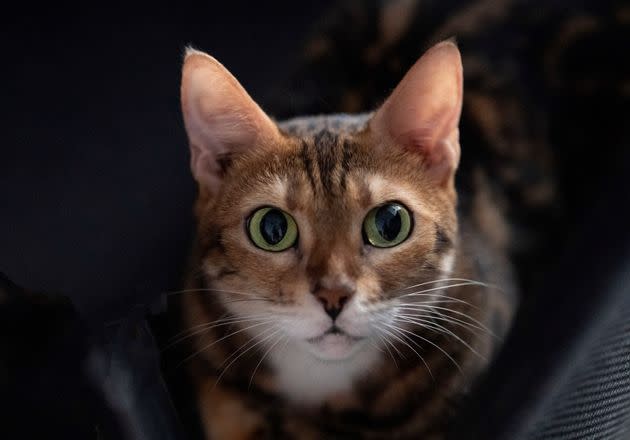Cats May Be The Only Mammals Who Can't Taste This 1 Flavour

We’ve written before at HuffPost UK about what certain cat noises mean, as well as why your feline “friend” insists on headbutting you.
We’ve even shared how their litterbox behaviour changes when they’re unhappy.
But what about (forgive the terminology) the other end of their eating habits? Because I don’t know about you, but I had no idea until today that cats very probably can’t taste sweet things.
Why?
Scientific American says that cats are missing a vital protein necessary to taste the sweet stuff ― at least, in the same way we do.
“The sweet receptor is actually made up of two coupled proteins generated by two separate genes: known as Tas1r2 and Tas1r3,” they write. But cats “lack 247 base pairs of the amino acids that make up the DNA of the Tas1r2 gene.”
That means that they probably taste something when they eat sweet stuff ― but it won’t be what we experience.
PetMD writes that cats are “seemingly alone among the mammal groups” with this evolutionary quirk (aww).
Though Joe Brand, a biochemist and associate director at the Monell Chemical Senses Center, told Scientific American that the difference was “lucky” as “Cats really have bad teeth as it is.”
So wait ― why does my cat like sweet food?
Some cat owners report their cats chowing down on marshmallows, cookies, and other sweet treats. But it’s likely the fat, not the sugar, they’re after, Pet MD says.
“They also have interest in anything with animal protein in it (such as milk, cream, or ice cream), foods with strong smells, or warm food (the temperature of freshly killed prey),” they add ― and anything with a new mouth feel is likely to pique their curiosity.
Lastly, before you start feeling too bad about the keto kitties, there are some flavours ― like adenosine triphosphate (ATP), a compound that provides energy for living cells ― that they can taste, but we can’t.
Swings and roundabouts, I guess (still, I’m pretty happy we got the “chocolate” side of the deal).

 Yahoo News
Yahoo News 